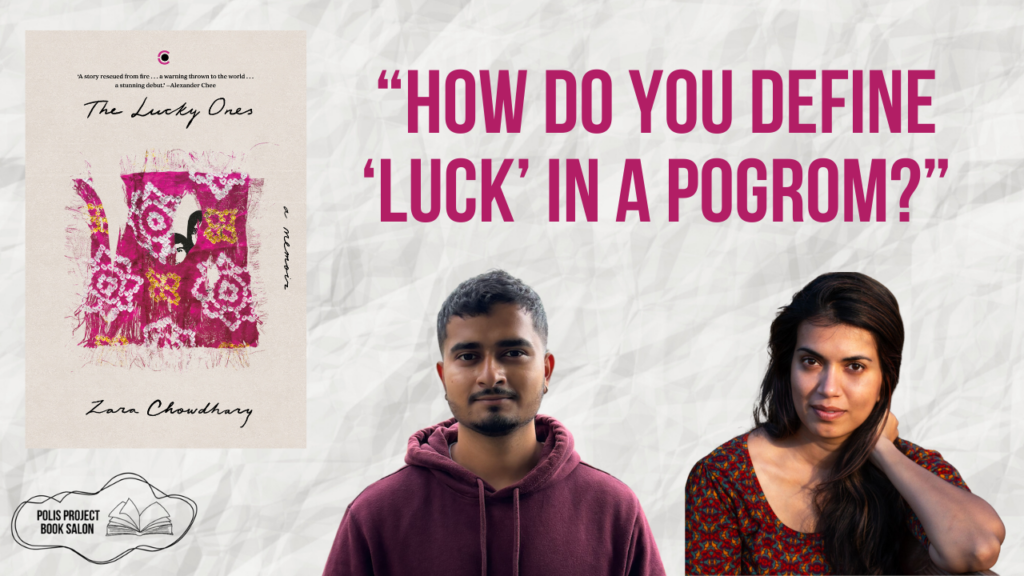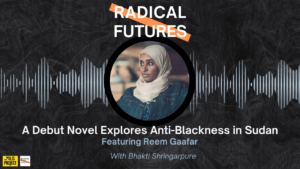
Zara Chowdhary on Memory, Muslim Girlhood, and the Violence of Forgetting

Zara Chowdhary’s debut memoir, The Lucky Ones, recounts her 16-year-old self going through the 2002 anti-Muslim pogrom in Gujarat. It begins by situating the wider tragedy, describing widely publicized massacres and victims, from Ehsan Jafri to Bilkis Bano. But this horror is just context for Chowdhary’s brooding bildungsroman.
The Lucky Ones is a genre-bending book that casts a wide net, tracing the ancient history of Gujarat and Chowdhary’s family history, while remaining immersed in her apartment—in C-8 Jasmine, on the “wrong” (Muslim) side of the Sabarmati river, in a ghettoized Ahmedabad—where she and seven members of her family remained stuck for months, frightened for their lives as carnage unfolded around them.
“Even in the middle of a genocide, people remain people, families remain complicated,” Chowdhary said to me during a live, virtual Book Salon hosted by The Polis Project in April. Her memoir examines not just the gruesome violence by mobs, but also the tension within her home, living with a resentful, patriarchal father and grandmother.
During the event, Chowdhary read some pages from the chapter titled “How to Grow Flowers in a Bedroom,” which captures the tension, fear, and pockets of happiness of her childhood. “What happens when your apartment is colonized?” Chowdhary asked, describing how she and her sister, Misba, would retreat into their parents’ bedroom, “when there would be violence within the household.”
Still, at the end of the chapter, she describes a moment of intimacy and joy as she and her sister dance in the bedroom. “There is nothing to dance about right now, but in C-8 Jasmine, there seldom is,” Chowdhary writes. “Dance is the only way Misba and I know how to transcend this reality.”
“Dance is teaching us what she can’t, mustn’t,” the author continues, referring to her mother. “That we have power. That as long as we have each other, our souls will be okay. She watches us bloom amid all this smoke, gracefully stretching into life, grateful. We are hers, thankful we are alive.”
While writing, Chowdhary frequently asked herself why someone would sit with a story that required such a great amount of emotional investment. Equally, she asked herself why she was writing this over 20 years after the fact, when the details of the pogrom are well-documented in rigorous journalistic and legal accounts.
Her response: “moments like these”—of joy, of resistance, of resilience—made it necessary to document and “trace the roots” of the richness that fed her even through the time of “emotional starvation or a sense of un-belonging.” The Lucky Ones is filled with such moments, brimming with rich, vivid descriptions, a strong voice, and complex characters.
In the Book Salon, I asked Chowdhary about her process of unearthing painful, raw memories and crafting them into a narrative, navigating the shame of writing with honesty about her family, constructing a sensitive portrait of her father, and avoiding the tropes about both Muslims and the trauma narrative.
What follows is an edited excerpt of the interview.
Author Bio: Zara Chowdhary is a writer and a creative writing and language educator. Her debut memoir, The Lucky Ones, was long-listed for the PEN/Galbraith Nonfiction award and selected amongst Time Magazine’s Ten Best Nonfiction Books of 2024. It was also an NPR, Esquire, People, Ms Magazine, Kirkus Reviews, and Electric Literature “best book” of the year. She has an MFA in Creative Writing and Environment from Iowa State University and an MA in Writing for Performance from the University of Leeds.





